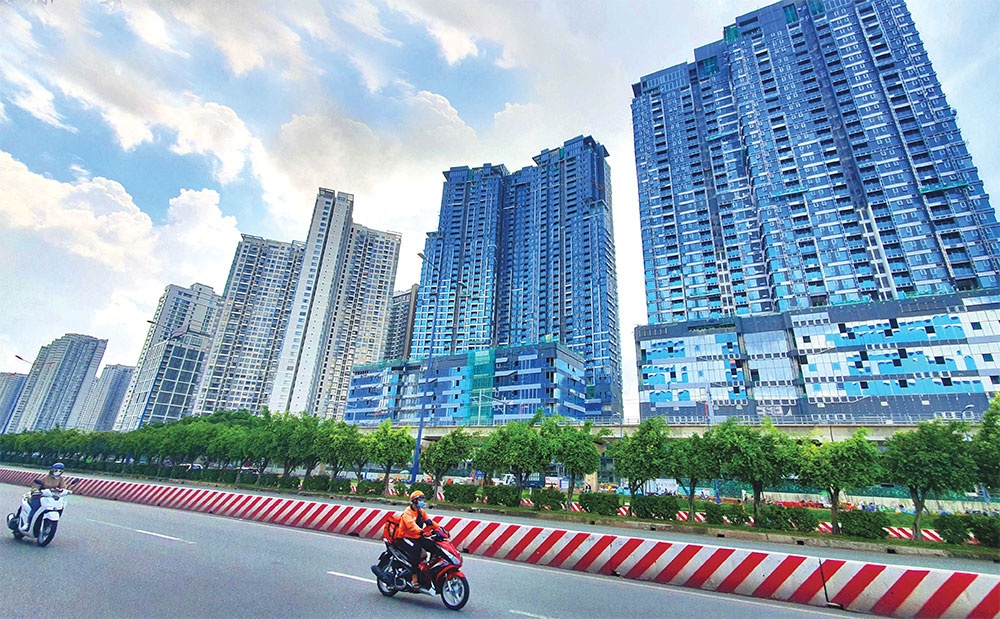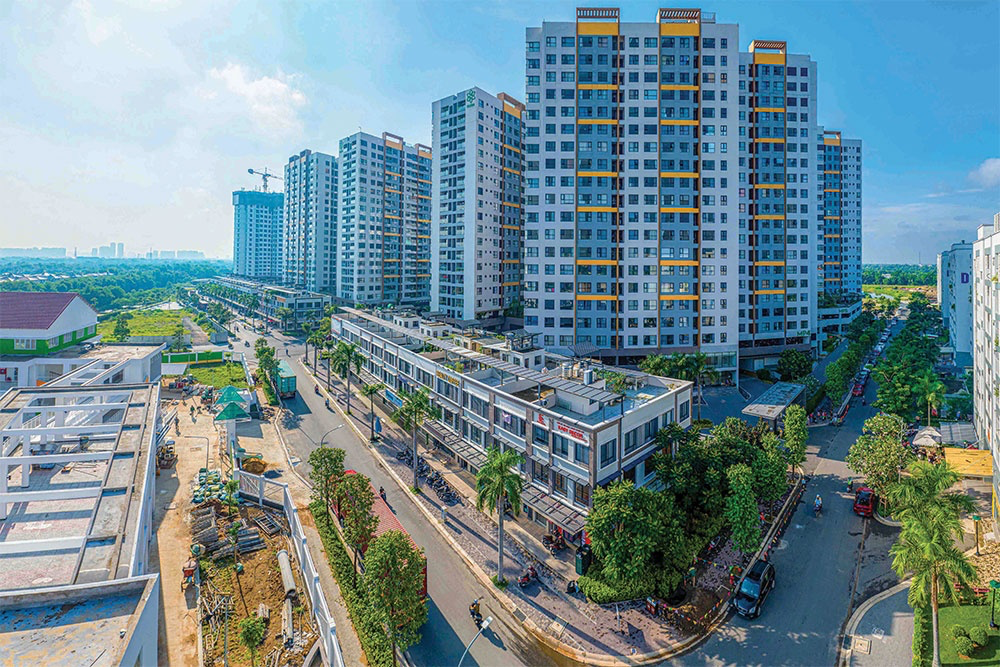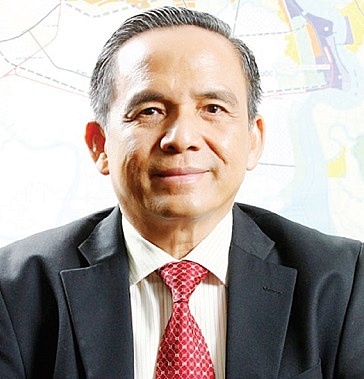Foundations being laid for 2024 real estate rejuvenation
 |
| A range of projects in infrastructure is likely to help boost real estate recovery next year, photo Le Toan |
At a government press conference on July 4, Deputy Minister of Construction Nguyen Tuong Van said based on recent reports sent by the local authorities of Ho Chi Minh City, Hanoi, Danang, Haiphong, Can Tho and Dong Nai to the government’s working group on boosting real estate, three key problems in the sector continue to be institutional implementation, bonds, and capital management.
The working group also made many recommendations to the prime minister, who has issued documents over the past few months on urgently dealing with issues in the sector.
Alongside that, the Ministry of Construction and the Ministry of Natural Resources and Environment have submitted to the National Assembly a series of new regulations related to real estate to help iron out issues.
As of June, out of over 100 projects in line for legal review, 16 projects in Ho Chi Minh City have been resolved. For the remaining projects on the waiting list, the city’s People’s Committee wants 50 more projects to resolved by the end of 2023.
The State Bank of Vietnam (SBV) has also issued a series of circulars on restructuring repayment terms and keeping the debt group of some enterprises unchanged, as well as on credit support and foreign banks buying and selling bonds.
There has been the approval of a credit package of $5.1 billion for the development of social housing, which is expected to be a driving force to boost the supply of social housing and worker housing projects in Ho Chi Minh City to address the supply-demand imbalance that has existed in the market for many years.
However, it may take some time to fully take advantage of this support package, as only six eligible projects in Ho Chi Minh City have been approved to receive a disbursement plan thus far.
In May, the government also issued a decree on the implementation of the Law on Land, which permits the issuance of certificates for certain types of tourist apartments, accommodation offices, tourist villas, and resorts.
The SBV has also lowered the operating interest rate three times consecutively since the beginning of the year. The average new deposit interest rate of banks is currently at about 6.1 per cent a year, down 0.37 per cent; the average new lending interest rate is about 9.07 per cent a year, down 0.9 per cent compared to the end of 2022.
According to experts, lower deposit interest rates can make investors move to new funding options instead of saving.
“The gradually cooled lending rate is expected to become a lever for businesses and investors, helping to increase liquidity and create impetus for real estate to recover,” said Dinh Quang Hinh, head of the Macroeconomics and Market Strategy Department of VNDirect Securities.
Another critical factor is a range of public infrastructure projects being kickstarted up and down the country. According to the Ministry of Transport, the road network planning for 2030 will prioritise the inclusion of high-speed highways in the investment portfolio, to eventually form a network of 5,000km.
Other positive signals include the inauguration ceremony of Dau Giay-Phan Thiet Expressway, Ring Road No.3, and the restarting of expressway construction at Ben Luc-Long Thanh after a four-year delay.
The Long Thanh International Airport project is expected to serve 100 million passengers a year and transport five million tonnes of cargo a year. Airports Corporation of Vietnam, after completing the selection of contractors, hopes to start construction of its airport terminal in August, at a cost of $1.45 billion.
Meanwhile, Duong Thuy Dung, executive director of CBRE Vietnam, commented that the liquidity of Ho Chi Minh City’s condominium market will be more dynamic in the latter half of 2023.
“Banks will lower home loan interest rates when pressure on the cost of capital has cooled down. Infrastructures projects such as metro lines and ring roads, as well as the authority’s efforts to review the legality of pending projects, are motivations for the market. The last six months of 2023 will be preparation time for the recovery of the Ho Chi Minh City real estate market,” Dung said
Bui Trang, country head of Cushman & Wakefield Vietnam, said that the real estate always went through four stages before forming a new cycle: recovery, growth, fever, and recession. In the past few months, Vietnam seems to be going through a quiet period.
“This status, however, can also be viewed optimistically, as the market is going through a detox period to become more sustainable and healthier,” Trang said.
 | Real estate tokenisation risks must be accounted for While real estate tokenisation offers advantages, it also presents potential risks. De-tokenisation is an important concept which affects the ability of the token to hold its value. It is the litmus test for token holders to validate the legal structure by exercising their rights to redeem the underlying title deed anytime. |
 | Real estate status puts paid to investment sharing apps Previously grasping the psychology of investors who do not have enough financial capacity to invest a large amount in real estate, many applications to share investment in a property have all but disappeared from the market. |
 | Positive developments in the real estate market The SBV has received 24 social housing initiative applications for a $5 billion loan package in six provinces, including 15 social housing projects in the provinces of Bac Giang, Tra Vinh, and Tay Ninh, and nine projects in the provinces of Binh Dinh, Phu Tho, and Ba Ria-Vung Tau. |
 | Vietnamese real estate heavyweights Novaland and Hung Thinh receive government support Major Vietnamese property developers Novaland and Hung Thinh are receiving strategic governmental support to untangle the regulatory complexities with their ambitious projects situated in Dong Nai and Binh Thuan, according to an announcement made by Deputy Minister of Construction Nguyen Tuong Van. |
| Can Van Luc - Member, National Financial and Monetary Policy Advisory Council
The real estate market will recover by the end of this year or early next year at the latest, depending on segments. There are four factors affecting the real estate market’s recovery. First is inflation: world interest rates have levelled off and are on a downward trend. Vietnam is also gradually reducing interest rates and this is an essential factor for the real estate market. Second, by the end of this year, the signs of economic recovery of the world and Vietnam will be clearer. Current forecasts suggest that the world economy, including Vietnam, will grow more positively. Third, legal problems have basically been removed. At the same time, real estate-related laws such as the Law on Land, the Law on Housing, and others will be passed by the National Assembly in the near future. Fourth, Vietnam’s public investment disbursement plan this year is about VND713 trillion ($29.7 billion), 25 per cent higher than last year and if this figure is fully disbursed, Vietnam’s GDP will grow by about 2 percentage points. Le Hoang Chau - Chairman, Ho Chi Minh City Real Estate Association
One of the bright spots for the real estate market in Ho Chi Minh City is a new resolution on exploiting its resources and potential to create a driving force for the southern economic hub. One of the important keys in urban embellishment and construction in Ho Chi Minh City is the issue of compensation and resettlement. The resolution allows the People's Council of Ho Chi Minh City to use the local budget for such activities. According to this mechanism, Ho Chi Minh City has both created a land fund to carry out on-site resettlement for people whose land has been recovered, and a fund by conducting land auctions, helping to effectively exploit land resources in the vicinity of traffic works and more besides. Vo Hong Thang - Director, Consultancy and Project Development, DKRA Group
State management agencies are speeding up the removal of obstacles to bolster the market. Although in the past, the impact of the above moves on the market have been not yet clear, these are solid foundations for a sustainable recovery at the end of 2023 or the first half of 2024. We can expect this because the real estate lending interest rates are decreasing, and the trend will continue. Although more or less room for loans is still a bit difficult to access, borrowing to buy real estate according to the consumption room is getting easier. The price level of real estate has decreased significantly over the past year to push the liquidity of the market higher with attractive prices. The disbursement of public investment has increased sharply. Domestic macroeconomic growth is quite stable, although GDP growth is not strong – in Q2 of 2023, it increased by 4.14 per cent – it is still at an acceptable level in the context that the world economy is facing many challenges. Also, inflation has remained below 4 per cent. |
What the stars mean:
★ Poor ★ ★ Promising ★★★ Good ★★★★ Very good ★★★★★ Exceptional
Related Contents
Latest News
More News
- Saigon Centre gains LEED platinum and gold certifications (February 12, 2026 | 16:37)
- Construction firms poised for growth on public investment and capital market support (February 11, 2026 | 11:38)
- Mitsubishi acquires Thuan An 1 residential development from PDR (February 09, 2026 | 08:00)
- Frasers Property and GELEX Infrastructure propose new joint venture (February 07, 2026 | 15:00)
- Sun Group led consortium selected as investor for new urban area (February 06, 2026 | 15:20)
- Vietnam breaks into Top 10 countries and regions for LEED outside the US (February 05, 2026 | 17:56)
- Fairmont opens first Vietnam property in Hanoi (February 04, 2026 | 16:09)
- Real estate investment trusts pivotal for long-term success (February 02, 2026 | 11:09)
- Dong Nai experiences shifting expectations and new industrial cycle (January 28, 2026 | 09:00)
- An Phat 5 Industrial Park targets ESG-driven investors in Hai Phong (January 26, 2026 | 08:30)




 Tag:
Tag:



















 Mobile Version
Mobile Version